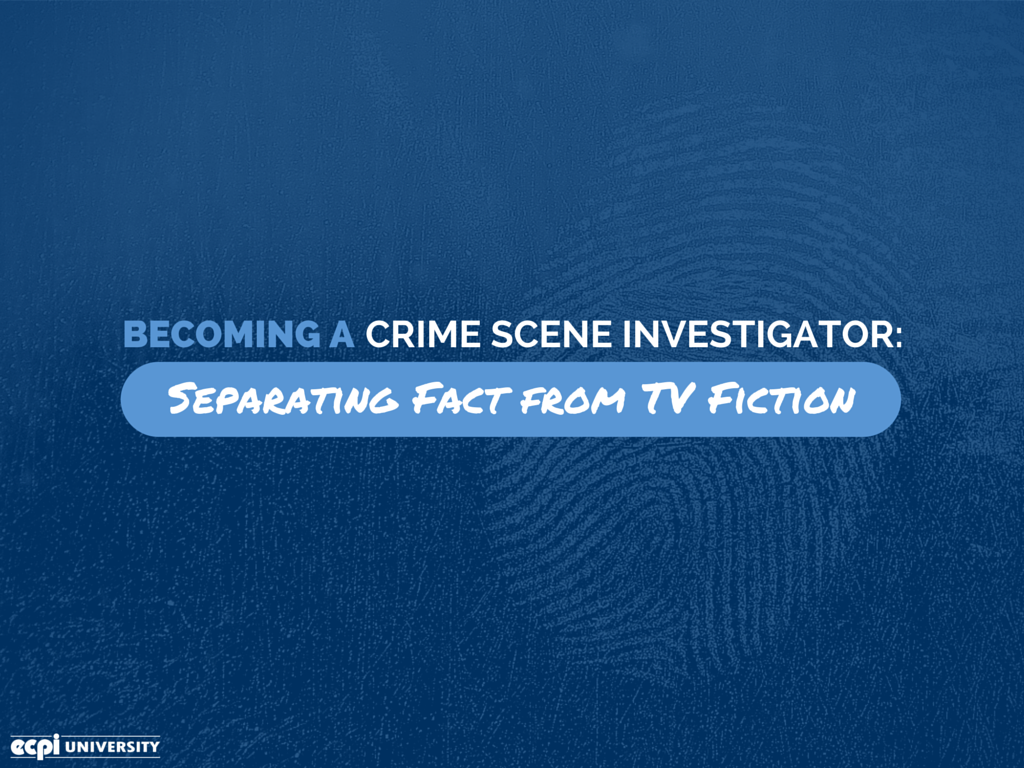
Becoming a Crime Scene Investigator: Separating Fact from TV Fiction
Many of todays most popular television shows feature crime scene investigators who use their amazing knowledge of science and incredible powers of observation to solve crimes. These shows are great entertainment and make the work of criminal forensics seem like a thrilling adventure every day.
If you love these shows and are inspired to look at a future in crime scene investigations, you might want to dig a little deeper to make sure you get a good idea of what a forensics analyst does in reality. The CSI that you see on TV paints an embellished and exaggerated picture of what a forensic analyst actually does [ ![]() Click to Tweet This ].
Click to Tweet This ].
Crime Scene Investigation & TV Fantasy
It is not that TV CSI's bear no resemblance to real-life forensic analysts, but that their role and procedures are exaggerated to create an entertaining TV show. It is true that there are many forensic specialists that get called out to crime scenes every day, but the TV shows introduce a few distortions.
- The crime shows give the impression that evidence collection and analysis proceeds in real-time alongside the investigation. On the TV show, the suspect is sitting in the investigation room while diligent CSIs are running tests that will condemn or exonerate him. In reality, forensic tests cannot be analyzed this quickly. They take weeks to process. By then, the initial investigation is most likely completed.
- The TV shows collapse the time frame of a criminal investigation. It seems like most crimes are solved in a few days. In reality, it can take months, even years to solve a crime.
- In many crimes shows, CSIs and forensic analysts go out and solve crimes. They interrogate witness, chase down suspects and make arrests. In reality, crime scene investigators manage the crime scene and any corpses, but they do not get involved in the investigation beyond processing the crime scene evidence.
- Crime shows depict crime scene investigators as bringing the most cutting-edge technology to bear on a crime. The forensics lab has access to advanced technology that can be deployed at the drop of a hat. In reality, forensics labs face budget constraints that limit the amount of analysis that can be done for any particular case. It is often not possible to apply cutting-edge technology to all crimes.
Real-Life Crime Scene Investigation Facts
Of course, TV shows must at least resemble real-life in order be believable. There are things that real-life crime scene investigators have in common with their TV counterparts. If you share some of the characteristics, then a life in forensic science might be for you.
- Forensic analysts are good at science. They need to have at least a basic familiarity with many aspects of science to process the evidence that they find on the crime scene. If you like science, then forensics may be a good choice for you.
- Crime scene investigators pay attention to details. They make a thorough analysis of the minute features of crime scenes, looking for the smallest details that may help in their analysis of what happened. If you think the devil is in the details, then you might enjoy being a CSI. [
 Click to Tweet This ]
Click to Tweet This ] - Forensics involves creativity, critical thinking, and problem solving. Forensic analysts must look at evidence creatively and use problem solving skills to analyze what happened. If you like puzzles and problem solving, then this crime scene investigations may be a good fit.
- Forensics is highly specialized. Some people focus just on footwear and the marks they leave behind at crime scenes. [
 Click to Tweet This ] Others focus on engineering aspects of reconstructing crimes and accidents. There are forensic accountants that analyze crimes involving finance and business. Each expert is able to contribute a piece to the overall investigation of a crime.
Click to Tweet This ] Others focus on engineering aspects of reconstructing crimes and accidents. There are forensic accountants that analyze crimes involving finance and business. Each expert is able to contribute a piece to the overall investigation of a crime.
Crime scene investigations might not be as glamorous as it is depicted on TV. It certainly does not mean a life of busting down doors and apprehending suspects; however, it can be a challenging and rewarding field, where you can use your intellect and creativity to contribute to the criminal justice system.
Crime scene from today's Students F.I.R.S.T. event. Poor guy never saw it coming! @ECPIUniversity #Whodunit #ecpi pic.twitter.com/StwX6qvJ54
Amelia Elizabeth (@nrseamelia) May 26, 2015
How to Become a Crime Scene Investigator
Does the real-life life of crime scene investigations sound attractive? At EPCI University, we offer a Bachelor of Science degree in Criminal Justice that could launch your future in forensic science. With flexible classes that run year-round, you could finish this degree in just 2.5 years. Who knows? You could be the next Horatio Cane!
Contact ECPI University TODAY! It could be the Best Decision You Ever Make!
DISCLAIMER - ECPI University makes no claim, warranty or guarantee as to actual employability or earning potential to current, past or future students or graduates of any educational program we offer. The ECPI University website is published for informational purposes only. Every effort is made to ensure the accuracy of information contained on the ECPI.edu domain; however, no warranty of accuracy is made. No contractual rights, either expressed or implied, are created by its content.
For more information about ECPI University or any of our programs click here: http://www.ecpi.edu/ or http://ow.ly/Ca1ya.


